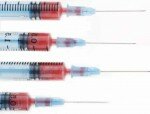Animal Vaccination Concerns:
Vaccine-Associated Auto-Immune And Other Diseases
by Michael W. Fox BVetMed, PhD, DSc, MRCVS***
By way of introduction to this critical review, I wish to make it clear at the onset that I am not opposed to the judicious use of vaccines. My approval is conditioned on the proviso that the deployed vaccines have high levels of proven safety and effectiveness for each species upon which they are used, and requires that they become part of an integrated, holistic health care and disease prevention program. When used as a sole therapy, vaccines do not constitute an effective preventive medicine regime. The myth of infectious and contagious diseases having a single cause—the infective organism—is at long last being abandoned as other co-factors are now being more widely recognized, extending the narrow view that developing a specific vaccine is all one requires to reduce the morbidity and mortality of a given disease.
As a veterinarian I am concerned about the consequences of the widespread dissemination of modified live virus (MLV) and genetically engineered (GE) virus strains through the mass vaccinations of humans, livestock and poultry, and in-house companion animals. Read more »




 Potent adjuvanted killed vaccines like those for rabies virus also can trigger immediate and delayed (vaccinosis) adverse vaccine reactions. Genetic predisposition to these disorders in humans has been linked to the leucocyte antigen D-related gene locus of the major histocompatibility complex, and is likely to have parallel associations in domestic animals.
Potent adjuvanted killed vaccines like those for rabies virus also can trigger immediate and delayed (vaccinosis) adverse vaccine reactions. Genetic predisposition to these disorders in humans has been linked to the leucocyte antigen D-related gene locus of the major histocompatibility complex, and is likely to have parallel associations in domestic animals.